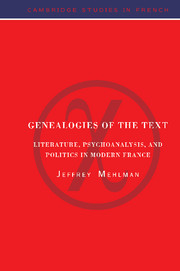Book contents
- Frontmatter
- Contents
- Acknowledgments
- 1 Introduction
- 2 Craniometry and criticism: notes on a Valéryan criss-cross
- 3 Literature and hospitality: Klossowski's Hamann
- 4 Literature and collaboration: Benoist-Méchin's return to Proust
- 5 “Pierre Menard, author of Don Quixote” again
- 6 Iphigenia 38: deconstruction, history, and the case of L'Arrêt de mort
- 7 Writing and deference: the politics of literary adulation
- 8 Perspectives: on Paul de Man and Le Soir
- 9 Prosopopeia revisited
- 10 The paranoid style in French prose: Lacan with Léon Bloy
- 11 The Holocaust comedies of “Emile Ajar”
- 12 Pour Sainte-Beuve: Maurice Blanchot, 10 March 1942
- 13 Flowers of evil: Paul Morand, the Collaboration, and literary history
- Appendix
- Notes
- Index
- Series list
4 - Literature and collaboration: Benoist-Méchin's return to Proust
Published online by Cambridge University Press: 19 January 2010
- Frontmatter
- Contents
- Acknowledgments
- 1 Introduction
- 2 Craniometry and criticism: notes on a Valéryan criss-cross
- 3 Literature and hospitality: Klossowski's Hamann
- 4 Literature and collaboration: Benoist-Méchin's return to Proust
- 5 “Pierre Menard, author of Don Quixote” again
- 6 Iphigenia 38: deconstruction, history, and the case of L'Arrêt de mort
- 7 Writing and deference: the politics of literary adulation
- 8 Perspectives: on Paul de Man and Le Soir
- 9 Prosopopeia revisited
- 10 The paranoid style in French prose: Lacan with Léon Bloy
- 11 The Holocaust comedies of “Emile Ajar”
- 12 Pour Sainte-Beuve: Maurice Blanchot, 10 March 1942
- 13 Flowers of evil: Paul Morand, the Collaboration, and literary history
- Appendix
- Notes
- Index
- Series list
Summary
I always think of Swann's story as Proust's equivalent of Wagner's Prize Song from Die Meistersinger.
M. Hindus, A Reader's Guide to Marcel ProustMight psychoanalysis itself, it has recently been asked, be une histoire juive – a fragment of Jewish history or, even more, an elaborate Jewish anecdote? In the course of the colloquium – in Montpellier – which pondered that question, D. Sibony chose to accord one Jewish joke emblematic status: Katzmann, intent on Gallicizing his name, translates Katz (=chat) and mann (=l'homme), and ends up as Monsieur Chalom. The onomastic malaise, the interlinguistic inventiveness mediating a blind and self-defeating aggression against the (name of the) father invite one to conclude that if indeed psychoanalysis may be construed as une histoire juive, it is in the sense of the anecdote just related. Call it the case of the Cat Man.
Sibony's joke may be found, in a curious transformation, toward the end of A la recherche du temps perdu. The narrator encounters Bloch, Proust's prototypal assimilated Jew, in the Guermantes salon: “J'eus de la peine à reconnaître mon camarade Bloch, lequel d'ailleurs maintenant avait pris non seulement le pseudonyme, mais le nom de Jacques du Rozier, sous lequel il eût fallu le flair de mon grand-père pour reconnaître la ‘douce vallée’ de l'Hébron et les ‘chaînes d'lsraël’ que mon ami semblait avoir définitivement rompues.” The attentive reader realizes that in his flight from Jewishness, Bloch has inadvertently taken on the name of the Judengasse – la rue des Rosters – which Charlus, a thousand pages earlier, had deemed the only address fit for him.
- Type
- Chapter
- Information
- Genealogies of the TextLiterature, Psychoanalysis, and Politics in Modern France, pp. 53 - 66Publisher: Cambridge University PressPrint publication year: 1995



